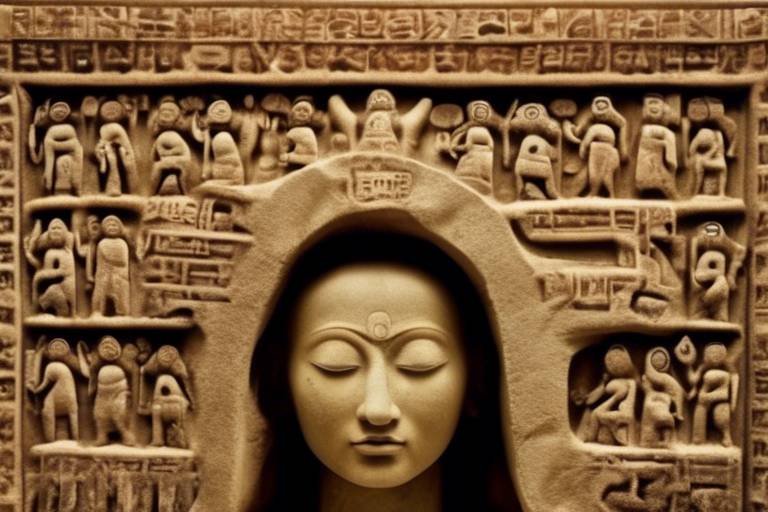The Legacy of the Age of Enlightenment in Modern Society
The Age of Enlightenment, a period of intellectual flourishing in the 18th century, continues to cast a profound influence on contemporary society across various domains. From reshaping the foundations of democracy and governance to fostering scientific progress, philosophical thought, and artistic expression, its legacy endures as a beacon of rationality and progress. Let's delve into how the Enlightenment era has left an indelible mark on the fabric of modern civilization.

Democracy and Governance
Exploring the enduring impact of the Age of Enlightenment on contemporary society, from its influence on democracy and human rights to its effects on science, philosophy, and the arts.
During the Age of Enlightenment, profound changes in political thought revolutionized the way societies were governed. The ideals of reason, individual rights, and the rule of law championed by Enlightenment thinkers such as John Locke and Montesquieu laid the foundation for modern concepts of democracy and governance. These principles emphasized the importance of a social contract between the government and the governed, promoting the idea that power should be derived from the consent of the people.
Enlightenment philosophy inspired the development of democratic systems that prioritize the protection of individual liberties, equality before the law, and the separation of powers. The legacy of the Enlightenment in governance can be seen in the establishment of constitutional democracies, where checks and balances ensure accountability and prevent the concentration of power in the hands of a few.
Moreover, the Enlightenment's emphasis on rationality and critical thinking has influenced political decision-making processes, encouraging leaders to base their policies on evidence and logic rather than tradition or dogma. By promoting transparency, civic participation, and the protection of human rights, Enlightenment ideals continue to shape modern governance structures and foster a more just and equitable society.

Scientific Progress
Exploring the enduring impact of the Age of Enlightenment on contemporary society, from its influence on democracy and human rights to its effects on science, philosophy, and the arts.
The Age of Enlightenment heralded a new era of scientific progress by championing reason, empiricism, and the scientific method as the pillars of knowledge acquisition. Think of it as a grand scientific explosion, igniting the pursuit of truth and understanding in ways never seen before. Scientists and thinkers of the Enlightenment era sought to unravel the mysteries of the natural world through observation and experimentation, paving the way for the scientific advancements that continue to shape our world today.

Philosophical Thought
The Age of Enlightenment, with its emphasis on reason and rationality, has left a profound mark on modern philosophical thought. The legacy of this intellectual movement can be seen in contemporary ethical and moral debates, where Enlightenment ideas on freedom, equality, and human nature continue to resonate.
Enlightenment philosophers such as Voltaire, Rousseau, and Locke advocated for the power of reason in shaping society and governance. Their beliefs in individual rights, social contract theory, and the pursuit of knowledge have influenced modern conceptions of justice and liberty.
One of the central themes of Enlightenment philosophy is the importance of critical thinking and intellectual autonomy. These principles have had a lasting impact on education systems, promoting a culture of inquiry, debate, and the free exchange of ideas.
Moreover, Enlightenment thinkers challenged traditional authority and dogma, paving the way for a more secular and humanistic approach to ethics and morality. Their emphasis on the inherent dignity and worth of every individual has shaped contemporary discussions on human rights and social justice.
Through their writings and ideas, Enlightenment philosophers sought to illuminate the path towards a more enlightened and compassionate society. Their legacy continues to inspire thinkers and activists to strive for a world built on reason, tolerance, and the pursuit of truth.

Art and Culture
Exploring the enduring impact of the Age of Enlightenment on contemporary society, from its influence on democracy and human rights to its effects on science, philosophy, and the arts.
Art and culture during the Age of Enlightenment were profoundly influenced by the values of reason, rationality, and expression. Artists and thinkers of the time sought to depict the world in a more realistic and intellectually stimulating manner, moving away from the constraints of traditionalism. This period witnessed the rise of artistic movements such as Neoclassicism and Romanticism, each reflecting the intellectual and emotional currents of the era.
The Enlightenment encouraged artists to explore new themes and experiment with different styles, leading to a flourishing of creativity across various mediums. Painters like Jacques-Louis David and Francisco Goya captured the spirit of the age through their works, depicting historical events and societal issues with a sense of moral purpose and intellectual depth.
Literature also experienced a renaissance during this period, with writers like Voltaire, Mary Wollstonecraft, and Johann Wolfgang von Goethe challenging conventional norms and advocating for social change through their works. The Enlightenment's emphasis on individualism, freedom of thought, and the power of reason inspired literary masterpieces that continue to resonate with audiences today.
Furthermore, the Enlightenment's impact on cultural norms and practices can still be seen in contemporary society. Concepts such as the pursuit of knowledge, the celebration of diversity, and the importance of artistic expression have become integral to modern creative endeavors. From film and music to architecture and fashion, the legacy of the Enlightenment continues to shape and inspire cultural innovation and artistic expression around the world.
In essence, the Age of Enlightenment revolutionized the way art and culture were perceived, setting the stage for a more enlightened and intellectually vibrant society that values creativity, critical thinking, and the exploration of new ideas.

Education and Enlightenment
Exploring the enduring impact of the Age of Enlightenment on contemporary society, from its influence on democracy and human rights to its effects on science, philosophy, and the arts.
The Age of Enlightenment revolutionized the way education was perceived, emphasizing the importance of critical thinking, knowledge dissemination, and intellectual freedom. This era championed the idea that education should not only provide information but also cultivate reasoning skills and promote independent thought.
Enlightenment philosophers believed that education was key to societal progress and individual empowerment. They advocated for accessible education that would enable people to question authority, challenge traditional beliefs, and contribute to the advancement of society through informed decision-making.
One of the core principles of Enlightenment education was the promotion of intellectual curiosity and the pursuit of knowledge for its own sake. This emphasis on learning for personal growth and enlightenment laid the foundation for modern educational systems that aim to develop well-rounded individuals capable of critical analysis and creative problem-solving.
Enlightenment thinkers envisioned education as a tool for liberation, enabling individuals to break free from ignorance and superstition. By encouraging the exploration of diverse ideas and fostering open dialogue, Enlightenment education sought to create a more enlightened and tolerant society that valued intellectual diversity and free expression.
Today, the legacy of Enlightenment education can be seen in educational institutions worldwide that strive to instill in students the values of reason, inquiry, and intellectual autonomy. By promoting a culture of lifelong learning and intellectual curiosity, modern education continues to be shaped by the ideals of the Enlightenment, preparing individuals to navigate an increasingly complex and interconnected world.
1. What were the main principles of Enlightenment education?
Enlightenment education emphasized critical thinking, knowledge dissemination, intellectual freedom, and the pursuit of knowledge for personal growth and societal progress.
2. How did Enlightenment education influence modern educational systems?
Enlightenment education laid the foundation for modern educational systems that prioritize reasoning skills, independent thought, and the cultivation of well-rounded individuals capable of critical analysis and creative problem-solving.
3. Why is intellectual curiosity important in education?
Intellectual curiosity fosters a love for learning, encourages exploration of diverse ideas, and promotes open dialogue, contributing to the development of a more enlightened and tolerant society.

Global Impact
Exploring the enduring impact of the Age of Enlightenment on contemporary society, from its influence on democracy and human rights to its effects on science, philosophy, and the arts.
The global impact of the Age of Enlightenment reverberates through the annals of history, shaping societies and cultures across the world. Enlightenment principles of tolerance, progress, and human rights have transcended borders, fueling movements for social justice, equality, and international cooperation.
One of the key legacies of the Enlightenment is the promotion of tolerance and respect for diverse perspectives. This emphasis on understanding and acceptance has played a pivotal role in fostering dialogue between nations and cultures, paving the way for a more interconnected and harmonious global community.
Moreover, the Enlightenment's advocacy for progress and human rights has catalyzed transformative movements that have challenged oppressive systems and advanced the cause of equality on a global scale. From the fight against colonialism to the push for gender and racial equality, the ideals of the Enlightenment continue to inspire advocates for social change worldwide.
Additionally, the Enlightenment's emphasis on reason and critical thinking has influenced the development of international cooperation and diplomacy. By prioritizing rational discourse and evidence-based decision-making, global leaders have been able to navigate complex geopolitical challenges and work towards shared goals for the benefit of humanity.
In an increasingly interconnected world, the principles of the Enlightenment serve as a beacon of hope and guidance, offering a path towards a more enlightened and inclusive future for all individuals, regardless of their background or beliefs.
1. How did the Age of Enlightenment impact education systems globally?
2. What are some contemporary challenges to Enlightenment values in modern society?
3. How are Enlightenment ideals relevant in addressing current societal issues?

Challenges to Enlightenment Ideals
Exploring the enduring impact of the Age of Enlightenment on contemporary society, from its influence on democracy and human rights to its effects on science, philosophy, and the arts.
As we delve into the realm of Enlightenment ideals that have shaped our modern world, it is crucial to acknowledge the challenges that threaten to undermine these cherished values. One of the primary challenges facing Enlightenment principles is the growing skepticism towards reason and rationality. In an era marked by misinformation and fake news, the very foundation of Enlightenment thought, based on logic and evidence, is being called into question.
Furthermore, the rise of nationalism poses a significant challenge to the universalist ideals of the Enlightenment. The emphasis on national identity and sovereignty often clashes with the Enlightenment's emphasis on universal human rights and cosmopolitanism. This tension between national interests and global cooperation challenges the very essence of Enlightenment values.
Another pressing issue confronting Enlightenment ideals is the erosion of freedom of speech and expression. In an age of increasing censorship and suppression of dissenting voices, the Enlightenment's emphasis on intellectual freedom and open discourse is facing serious threats. The ability to freely exchange ideas and challenge authority is essential for the continued relevance of Enlightenment principles in our society.
Moreover, the lack of progress in addressing social injustices and inequalities highlights a fundamental challenge to the Enlightenment's vision of a more equitable and just society. Despite centuries of Enlightenment influence, systemic discrimination and disparities persist, raising questions about the efficacy of Enlightenment ideals in achieving true social progress.
In navigating these challenges, it becomes imperative to reflect on how we can uphold and defend the core tenets of the Enlightenment in the face of contemporary obstacles. By addressing these challenges head-on and reaffirming our commitment to reason, human rights, and progress, we can strive towards a future that honors the legacy of the Age of Enlightenment in shaping a more enlightened and inclusive society.
Stay tuned for the FAQ section coming soon!

Future Prospects
Exploring the enduring impact of the Age of Enlightenment on contemporary society, from its influence on democracy and human rights to its effects on science, philosophy, and the arts.
Looking ahead, the future prospects of Enlightenment ideals present a compelling vision for society. As we navigate through complex global challenges, the principles of reason, tolerance, and progress remain essential in shaping a more enlightened and inclusive future for humanity. By embracing these values, we can foster dialogue, promote understanding, and work towards a world where equality and justice prevail.
Frequently Asked Questions
- What was the Age of Enlightenment?
The Age of Enlightenment, also known as the Age of Reason, was an intellectual and cultural movement in the 18th century that emphasized the power of reason, science, and individual liberty. It promoted ideals such as freedom, equality, and rationality, shaping modern thought and society.
- How did the Enlightenment influence modern democracy?
The Enlightenment laid the foundation for modern democracy by advocating for principles like popular sovereignty, the rule of law, and individual rights. Thinkers like John Locke and Montesquieu influenced the development of democratic systems that prioritize the will of the people and protect their freedoms.
- What impact did the Enlightenment have on scientific progress?
The Enlightenment promoted the use of reason and empirical evidence in scientific inquiry, leading to advancements in fields such as physics, chemistry, and biology. Thinkers like Isaac Newton and Francis Bacon championed the scientific method, which continues to drive innovation and discovery today.
- How did Enlightenment philosophy shape modern education systems?
Enlightenment thinkers believed in the power of education to foster critical thinking, knowledge dissemination, and intellectual freedom. Their ideas influenced the development of modern education systems that aim to cultivate informed and independent thinkers capable of contributing to society.
- What are some challenges to Enlightenment ideals in contemporary society?
Contemporary challenges to Enlightenment values include skepticism towards reason, the rise of nationalism, and threats to freedom of speech and expression. These challenges highlight the ongoing relevance of Enlightenment principles in addressing societal issues and promoting a more enlightened future.



















